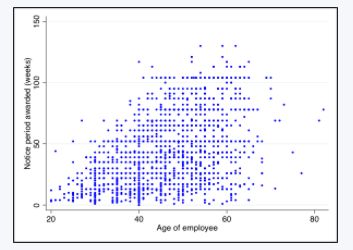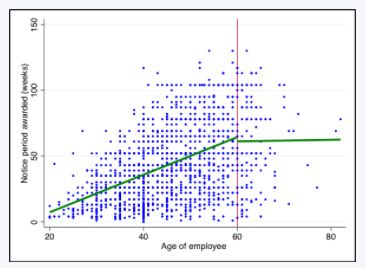A commonly held view among employment lawyers is that reasonable notice periods increase with the age of the employee. Is this always true? We looked at data from nearly 1,800 reasonable notice decisions by courts and tribunals across Canada since 1997. The data suggest that the story is a little more complicated. As a general matter, there is a positive relationship between age and notice periods. But notably, as workers approach retirement, we find an additional year of age adds little or nothing to notice periods.
First, let's look at the raw data. We plot the age of the employee against the notice period awarded (see Figure 1). The two are no doubt correlated. The older an employee, typically we see longer notice periods awarded. But the relationship is not tight. We see many examples of older employees receiving short notice periods. That is, there are clearly other, more important factors that help explain the variation in the length of notice period.

Figure 1: The relationship between age and notice periods.
Next, we can try and "fit" the best line that shows the relationship between age and reasonable notice periods. The line of best fit for all 1,800 decisions does a poor job of fitting a relationship between age and notice periods for employees at the higher end of the age scale. For observations where the employee is 60 or older, the line of best fit is, on average, higher than the actual notice period awarded.
One way to see this more clearly is to break the data up in two groups: one group of aged 60 and younger, the other for those over 60. We fit a best line for each group (see Figure 2.) Here, the data appear to show that an additional year of age after 60 adds little or nothing to the notice period.

Figure 2: Lines of best fit before and after age 60.
It is important to note here that age is clearly strongly correlated with the length of service. The older an employee, the more likely it is that they have been with the firm for a longer period of time. If we control for the length of service, we see that age has an even weaker relationship with notice periods awarded after the age of 60. Indeed, if we include all variables of interest - such as service, type of job, compensation, etc. - then regression analysis shows negative correlation between the age of an employee and reasonable notice awards in the group of employees aged 60 and over.
Interestingly, it is unlikely that this phenomenon can be explained by the imposition of a "2-year cap" on reasonable notice awards. In cases where such a cap might be binding, courts do not apply the cap to those over employees over the age of 60 any more than they do for younger employees. If anything, the data suggest the opposite.
In short, reasonable notice periods do not appear to keep increasing with age after 60. We pass no judgment on whether this is right or wrong; rather, we simply note that this is a pattern that seems to emerge from the decisions of courts and tribunals.
The content of this article is intended to provide a general guide to the subject matter. Specialist advice should be sought about your specific circumstances.


